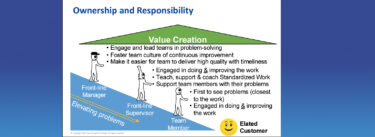Managers’ salaries and benefits packages aren’t what should be concerning us. What should be worrying all of us (stockholders, managers, employees, and the public) is the system regulating their compensation, which is based on an archaic managerial worldview and too often becomes a “gold elevator” that in effect creates organizational stagnation in a larger, already disrupted business environment.
What is this disruption we are experiencing? The changes have been local, global, and multi-dimensional: technological innovations; climate change, civil uprising and political unrest; drastic adjustments in public consciousness, consumer awareness, and the political arena. This rearrangement of our local and global systems is bringing about profound changes in how we do business and how we work together. It is destabilizing the validity of our established economic, political, and managerial paradigms. We are beginning to see that these old management paradigms may not be well-suited for creating the sustainable business strategies we all are seeking. This disruption means we are undergoing chaos, yes, but also profound transformation.
Now there is no other option for managers but to reboot their management style and call for a different mindset. We all must learn again how to lead a fragile organization in a reality on which we have limited control. And this disrupted business environment calls for lean thinking. We must unlearn traditional management’s underlying assumptions and values and be open to learn new (adaptive, agile, and opportunistic) ways to respond to disruptions and navigate new, stormy waters.
But despite sweeping changes to the business environment and real threats to organizational sustainability, too many managers remain stuck in traditional management roles and systems. Too many lack the ability to address our new reality of disrupted markets and outdated business models that actually no longer work for customers or employees. Why? Managers, trapped in their gold elevators, fear the loss of their compensation and remain frozen in their familiar (and wealthy) world.
These “captains,” those who are supposed to direct and lead in whatever environment we find ourselves in, most often do not understand how, in what direction and, most importantly, why they need to change their mindset. We need to move away from a stable products and services mindset and think about more effective ways the entire organization can work together to create value for customers.
Many managers’ distress stems from the loss of an ability to steer the ship, which is the essence of their work, their art, and the only justification for their high salaries. When surrounded by traditional organizational structures, managers seek a management tool that will restore their sense of control. Managers have a hard time understanding the connection between authority and responsibility. An authoritarian structure limits organizational flexibility and its ability to cope with a disrupted environment. Seeking control based on the fear of making mistakes (risking their compensation package) hinders innovation. The effective, agile organization is one that stands on its human quality of its people. The adaptive manager should learn how to trust, share responsibilities, coach, and develop people as leaders and change agents. Lean management aims to develop people, our most reliable resource. The lean learning method (PDCA) creates an effective steering and pivoting mechanism in an environment that otherwise can feel like a maze.
Managers whose old work patterns have been disrupted experience real professional anxiety, so they seek straightforward answers and clear paths for action. They don’t see the danger posed by their familiar response patterns to the disruptions we are experiencing.
Thankfully, some old-school managers have doubts about how well their old work patterns are actually working. How could they not? The shelves of old-school business and management departments are filled with now obsolete books. Academics stand perplexed, lacking a scientific management paradigm to use as a roadmap. Without notice, so many executives are left exposed at the top.
In these times, the obsession over keeping control that we see so often in our organizations is not unlike a driver slamming down the gas pedal, only causing the wheels of the vehicle to sink deeper in the sand. What happens when it turns out that exerting greater force in executing our old patterns still doesn’t get us what we want?
When economic disruption threatens business survival, reactions range from blatantly hostile (towards employees, suppliers, and customers) to passive aggressive: “We fell victim to a disrupted and compromised reality.” And when organizations are too big to fail, they often turn to governments for protection and assistance.
I have met very few managers who are attentive to revolutionary ideas and prepared to adopt the principles of lean management as a paradigm that fits the circumstances of our time. Those who bear the responsibility to grapple with a disrupted reality do not see the risk that their conservatism entails. They prefer the short-term financial profit (organizational and personal) to fulfilling the organization’s purpose of creating real value for its customer.
One hopes we all will regain our composure and embrace change, because the fundamental laws of nature apply to the business world as well. Those who are able to adapt will survive and those who remain stuck will vanish, overwhelmed by the disruption of the world around them. Lean is a revolutionary viewpoint on what is already a disrupted reality. Instead of thinking about how to incorporate improvement methods into a traditional management approach, we should learn to shake it up and attempt to dismantle it and build something new by using lean thinking.
Will 21st century managers be able to see beyond the walls of their sealed gold elevator? Will they lead, or be swept along into the sediment of the disrupted reality?





